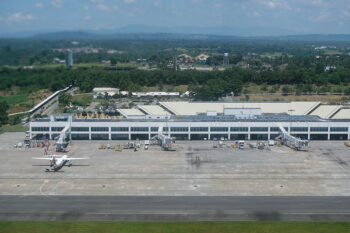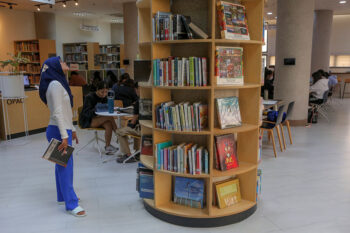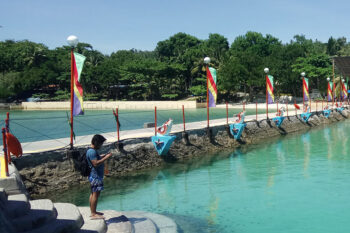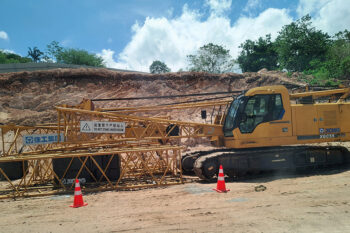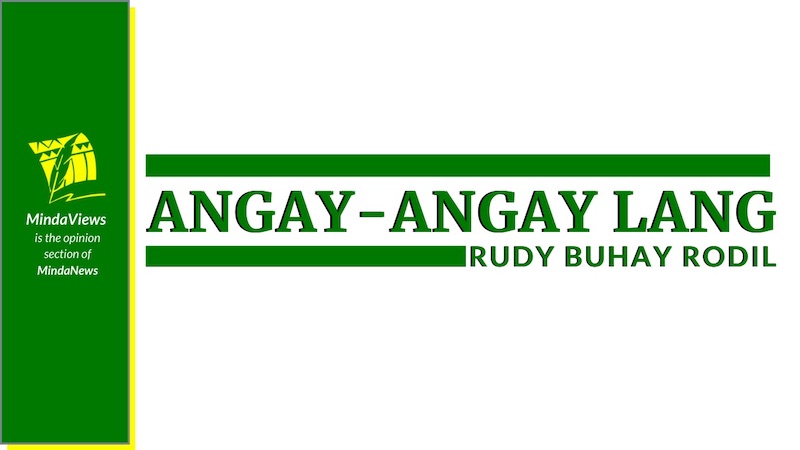
1st of two parts
ILIGAN CITY (MindaNews / 04 October) — This was written in 1992, viewed from the government side. Now, this is a way of Looking Back: Lessons from the past peace negotiations between the Philippine Government ang the Moro National Liberation Front (MNLF. This comes in two parts. Part I covers the negotiations, 1975-1987. Part II encompasses the territory question.
Part I The Negotiations
As far as we know, there were only three distinct negotiations from 1975 to 1987. The first took place in Jeddah, Saudi Arabia, on January 18-29, 1975.
The second was held in Tripoli, Libya on 15-23 December 1976.
And the third was that started by President Aquino on September 5, 1986 and ended with Ambassador Emmanuel Pelaez on 7 May 1987.
There is no need perhaps to detail these since they have been publicized many times before and deliberated on in a number of conferences as well.
Secretary Alejandro Melchor headed the Philippine panel in 1975 and across him sat MNLF Chairman Nur Misuari. This negotiation immediately hit a snag due allegedly to the impossible demands of the MNLF. As described by Dr. Adam Malik, then Indonesian Foreign Minister:
As we see it, the failure was partly attributable to the complexity of the question, but certainly due to the disproportionate demand put forward by the rebel faction headed by Mr. Nur Misuari. To insist on a prior public declaration agreeing to the creation of an autonomous region, with a separate government and army, as a condition for the success of those talks, we believe cannot be accepted by any sovereign government worthy of its name. (Source: Background on the Situation in Southern Philippines. Department of Public Information. October 1976, p. 29)
Held in Tripoli, Libya, the second negotiation on December 15-23, 1976 led to the Tripoli agreement. Undersecretary Carmelo Barbero led the Philippine government panel and Mr. Nur Misuari headed the MNLF group. As chairman of the Quadripartite Ministerial Commission, Libyan Foreign Minister Ali Abdussalam Treki, presided over the negotiation.
The third of the talks was first initiated in Jolo between President Corazon Aquino and MNLF Chairman Nur Misuari, was continued in Jeddah, Saudi Arabia by Agapito Aquino who not long after handed over the responsibility to Aquilino Pimentel (Nur Misuari sat for the MNLF), then resumed in the Philippines by Ambassador Emmanuel Pelaez and Habib Hashim, where it collapsed.
Pimentel came home with the Jeddah Accord in which it was agreed, among other things, “to continue discussion of the proposal for the grant of full autonomy to Mindanao, Basilan, Sulu, Tawi-Tawi and Palawan subject to democratic processes
Since it was January 3, 1987, and the draft of the New Constitution was completed, there was also an MNLF proposal for Pres. Aquino “to issue an executive order suspending pertinent provisions of the draft constitution on the grant of autonomy to Muslim Mindanao in the scheduled plebiscite on February 2, 1987, to allow the MNLF to undertake democratic consultations with the people of Mindanao and its islands”. The OIC continued to play a vital role as mediator.
In the Philippines, a time frame of 90 days was set within which to come up with an agreement. It started on February 9 and ended on May 7, 1987. The portion of the talks held in the country with Pelaez was the first time that Misuari was not directly involved. Neither was the OIC in the scene.
Lessons That May Be Useful In The Future
The Role of the OIC. The Organization of Islamic Conference (OIC) played a vital and decisive role in the negotiations. It is unfortunate though that the government has made an official evaluation only for the talks in Tripoli.
As reported by Undersecretary of National Defense Carmelo Barbero, chief negotiator for the Philippine Government, during the entire period of negotiation in Tripoli, the role of Dr. Treki was noticeably dominant. As a matter of fact, he said, the Philippine panel was negotiating with him, not with Mr. Misuari. The three other members of the Quadripartite Commission did his bidding.
It is important for us to understand how the OIC got involved because as far as its organizational policies are concerned, non-members have no obligation to follow their regulations. And no country may be a member of the OIC if it is not Muslim.
I recall that during the first week of our life as Regional Consultative Commission for Muslim Mindanao, when we had this live-in seminar at the Asian Institute of Management, April 4-8, 1988, one of our lecturers was Ambassador Pacifico Castro. He related that two important developments in 1973-74 prompted the Philippine government to accept OIC mediation in the Mindanao problem.
First, the Armed Forces of the Philippines were short of ammunition and America was not willing to extend a helping hand. War with the Bangsa Moro Army was raging, and if nothing was done about it immediately, the consequences could be serious for the government. And, second, OPEC imposed an oil embargo on those countries supporting Israel in the 1973 war. One of them was the Philippines.
The first problem was solved by purchasing the necessary military materiel from other countries.
The second problem could be resolved only if the King of Saudi Arabia, who was most influential in the OPEC, would be persuaded to lift the oil embargo on the Philippines. It took some time, but the Saudi King finally relented — with a condition: that the Philippine Government would negotiate with the MNLF under the auspices of the OIC.
The OIC itself created the Quadripartite Ministerial Commission composed of Libya, Saudi Arabia, Somalia and Senegal. Chairman was the Libyan representative who at that time was Dr. Treki.
And so, when the OIC met on June 21-25 in Kuala Lumpur, it passed Resolution No. 18 urging the Philippine government to find a solution for the Mindanao problem within the territorial integrity and the national sovereignty of the Republic of the Philippines. President Marcos agreed and so there was the negotiation with the MNLF.
One week prior to the formal talks in Jeddah in 1975, President Suharto of Indonesia intimated to President Marcos through his Foreign Minister that his country is prepared to support the OIC Resolution No. 18.
It should come as no surprise if President Marcos was ill at ease with this interference. This will be noticed in the written objectives of the Tripoli negotiations. The first objective was to reach an agreement with the MNLF so as to end the war in southern Philippines and it was expected that as a result of this the Muslim Filipinos would be removed from the agenda of the Islamic Conference.
This became a reality only in the time of President Aquino. The OIC did not take part in the actual talks. Ambassador Pelaez nonetheless saw it fit to communicate the results of his talks with Mr. Habib Hashim to the Secretary General of the OIC.
Twice in Tripoli the talks almost collapsed, too, Dr. Treki threatened that any collapse in the negotiations must be blamed on the Philippine government, that he would recommend to the OIC that all talks with the Philippine government must cease, and that he would raise the problem to the Security Council and the General Assembly of the United Nations, and that economic sanctions be imposed on the Philippines.
What lessons can we learn from these experiences? These are not easy to extract out because it is obvious that the Philippine government had no choice as far as the involvement of the OIC with the Mindanao problem was concerned — it was outmaneuvered by the MNLF. But it is obvious, too, that such interference from the outside becomes a blot on the national sovereignty of the Republic. There is also the matter of worthiness in one’s words. The OIC said, for instance, that the framework of the negotiation would be the territorial integrity and national sovereignty of the Republic of the Philippines. If this is true, then Dr. Treki may have exceeded his role as presiding officer of the talks.
In light of such external interference, can we regard the negotiation as a success? Undersecretary Barbero reported that the RP Panel was subjected to intense psychological and physical pressure which hampered the negotiation. Libya controlled everything, the schedule, their movements, their appointments, and their food. A crate of supplies brought along by the Panel was held by the Libyan authorities for five days. There were also the two threats already mentioned. This was aggravated by the conviction of the Philippine Panel that it was easily within the capability of Libya and the OIC to make good their threats.
There is also the highly embarrassing matter of the Philippine government being made to face a group of rebels which it used to give no importance to, yet must now sign an agreement with.
Be that as it may, the RP Panel believed that they got what they came for: a ceasefire which would mean saving thousands of lives and resources. They also won the goodwill of the OIC, if the happiness and satisfaction shown by President Khadaffy, Dr. Treki and the Secretary General of the OIC could be a gauge. (MindaViews is the opinion section of MindaNews. A peace specialist, Rudy Buhay Rodil is an active Mindanao historian and peace advocate)
TOMORROW: Sensitive Issues in the Negotiations



